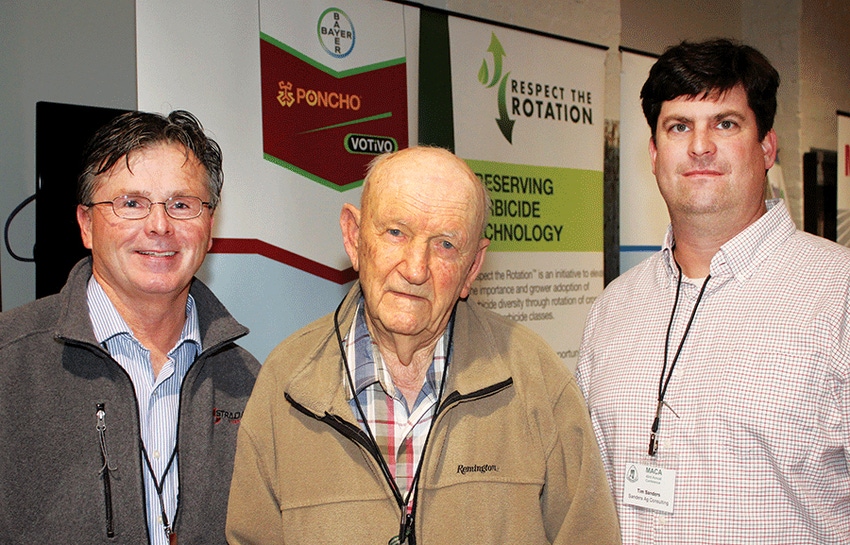July 25, 2016

Members of a professional crop consultants’ organization benefit growers’ bottom line — he/she is one input growers don’t want to cut. The Mississippi Agricultural Consultants Association (MACA) and its members have served farmers since 1973.
“We are independent professionals, using integrated pest management practices, making no-biased recommendations concerning seed variety selection and placement, soil fertility, insect, weed and disease control,” says Winston Earnheart, MACA president. “We promote ethical recommendations based on low environmental impact and sound science.”
Earnheart, who is based in Tunica, Miss., and has consulted for 45 years, says growers need an independent and objective set of eyes in the field on at least a weekly basis. Then, after identifying a potential pest problem — insects, weeds, diseases — a consultant can determine which products would best control the problem or determine if a treatment is really needed.
“For instance, some of the latest research has shown that late-season three-cornered alfalfa hoppers do not damage soybeans enough to justify treatment,” Earnheart explains. “Confirming this research with scouting, we can help growers avoid spending thousands of dollars on an application.
“The same thing with bollworms, which are easy to detect in soybeans. Often the bollworm count isn’t anywhere close to economic threshold. Again, confirmed by scouting, we can sometimes help a grower avoid a treatment and save money.”
In addition to being another set of eyes for the grower in the field, independent consultants are growers’ ears at research seminars. “Because of the business demands of running their operations, farmers don’t have time to go to all the educational meetings during the off-season that an independent crop consultant constantly attends,” Earnheart says.
“Our consultants go to many university meetings, not only in Mississippi, but also in other Mid-South states to keep on top of the latest research.
“Consultants constantly talk with each other, sharing information about insect infestation levels and which products are working the best. During all the meetings we attend, we learn as much from each other as we do from the presented materials.
“During the season, we network to keep an eye on what’s going on in fields south of us to give us a little warning before insects move north toward us.”
Some independent crop consultants are involved in a grower’s operation from variety selection through defoliation. In addition to scouting for pests, they help growers with fertility, irrigation and other aspects of their operation.
“Crop consultants also help work up fertilizer and pesticide budgets that are the most cost-effective options for growers,” Earnheart says. “This is part of our winter planning sessions with our growers. We provide budgets that vary from farm to farm, from field to field.”
Helped regional crop transformation
The Mid-South has transitioned from predominantly cotton production to now grains production, and independent crop consultants helped the region’s growers make that transition seamlessly. “As cotton acreage dropped, grains became the primary crops; we helped growers learn how to farm them for optimum yield potential,” Earnheart says.
Independent crop consultants work closely with allied industry on product stewardship to use materials efficiently and extend their usage. “We work closely with allied industry — the manufacturers and the distributors,” Earnheart says. “We work with distributer fieldmen and company reps; it’s a team effort to help the grower do the best job possible.”
An exceptional resource
Angus Catchot, Mississippi Extension entomologist, works with independent crop consultants across the state and says they offer growers an exceptional resource at an exceptional price. “It’s a great value,” Catchot says. “You benefit from all of a consultant’s knowledge and experience for just a fraction of a bushel of soybeans or a bushel of corn per acre.”
Catchot says the profession has evolved over the years so independent crop consultants are no longer just bug checkers; most are involved in all aspects of production, including controlling resistant weeds. “They are constantly involved in continuing education, attending many winter meetings that growers do not have the time to attend,” he says.
Consultants also provide a voice for growers outside of the field. “MACA and other state consultant organizations represent a unified voice representing agriculture on issues with government agencies, such as the EPA, and promoting agriculture to Congress,” Catchot says.
For example, MACA submitted a letter during the comment period for a Section 18 emergency exemption label for the use of Transform; it was announced recently that the EPA granted the label. “Consultants leave footprints in the field and in Washington, D.C.,” Catchot adds.
You May Also Like




